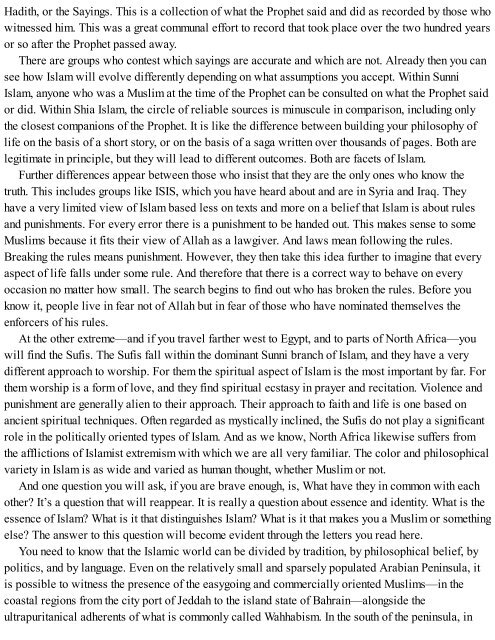1250119847
Create successful ePaper yourself
Turn your PDF publications into a flip-book with our unique Google optimized e-Paper software.
Hadith, or the Sayings. This is a collection of what the Prophet said and did as recorded by those who<br />
witnessed him. This was a great communal effort to record that took place over the two hundred years<br />
or so after the Prophet passed away.<br />
There are groups who contest which sayings are accurate and which are not. Already then you can<br />
see how Islam will evolve differently depending on what assumptions you accept. Within Sunni<br />
Islam, anyone who was a Muslim at the time of the Prophet can be consulted on what the Prophet said<br />
or did. Within Shia Islam, the circle of reliable sources is minuscule in comparison, including only<br />
the closest companions of the Prophet. It is like the difference between building your philosophy of<br />
life on the basis of a short story, or on the basis of a saga written over thousands of pages. Both are<br />
legitimate in principle, but they will lead to different outcomes. Both are facets of Islam.<br />
Further differences appear between those who insist that they are the only ones who know the<br />
truth. This includes groups like ISIS, which you have heard about and are in Syria and Iraq. They<br />
have a very limited view of Islam based less on texts and more on a belief that Islam is about rules<br />
and punishments. For every error there is a punishment to be handed out. This makes sense to some<br />
Muslims because it fits their view of Allah as a lawgiver. And laws mean following the rules.<br />
Breaking the rules means punishment. However, they then take this idea further to imagine that every<br />
aspect of life falls under some rule. And therefore that there is a correct way to behave on every<br />
occasion no matter how small. The search begins to find out who has broken the rules. Before you<br />
know it, people live in fear not of Allah but in fear of those who have nominated themselves the<br />
enforcers of his rules.<br />
At the other extreme—and if you travel farther west to Egypt, and to parts of North Africa—you<br />
will find the Sufis. The Sufis fall within the dominant Sunni branch of Islam, and they have a very<br />
different approach to worship. For them the spiritual aspect of Islam is the most important by far. For<br />
them worship is a form of love, and they find spiritual ecstasy in prayer and recitation. Violence and<br />
punishment are generally alien to their approach. Their approach to faith and life is one based on<br />
ancient spiritual techniques. Often regarded as mystically inclined, the Sufis do not play a significant<br />
role in the politically oriented types of Islam. And as we know, North Africa likewise suffers from<br />
the afflictions of Islamist extremism with which we are all very familiar. The color and philosophical<br />
variety in Islam is as wide and varied as human thought, whether Muslim or not.<br />
And one question you will ask, if you are brave enough, is, What have they in common with each<br />
other? It’s a question that will reappear. It is really a question about essence and identity. What is the<br />
essence of Islam? What is it that distinguishes Islam? What is it that makes you a Muslim or something<br />
else? The answer to this question will become evident through the letters you read here.<br />
You need to know that the Islamic world can be divided by tradition, by philosophical belief, by<br />
politics, and by language. Even on the relatively small and sparsely populated Arabian Peninsula, it<br />
is possible to witness the presence of the easygoing and commercially oriented Muslims—in the<br />
coastal regions from the city port of Jeddah to the island state of Bahrain—alongside the<br />
ultrapuritanical adherents of what is commonly called Wahhabism. In the south of the peninsula, in
















